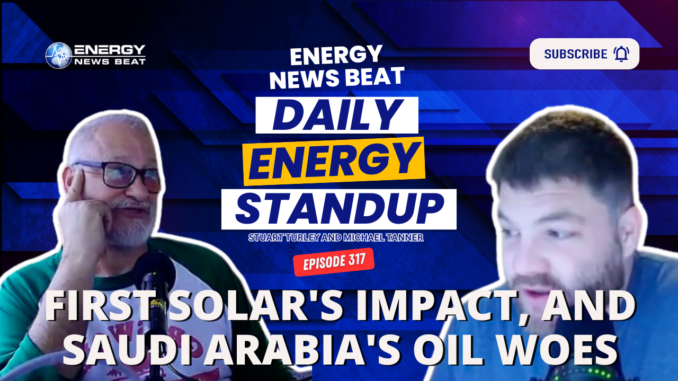
Daily Standup Top Stories
Energy Secy. Granholm explains the clean energy ‘battle’ – Really?
The Biden administration has made some big investments into infrastructure and clean energy initiatives within the US. However, two years into the push to transition the country to clean energy, the government is still behind […]
First Solar could have $5 billion impact on U.S. economy by 2026 – But at what cost? Is there a formula for printed money cost and subsidies?
ENB Pub Note: Tammy Nemeth, author and podcast host, brought out a great point in this article. At what cost can we place on the printing of money and the subsidies? It would seem that […]
Saudi Arabia Can No Longer Raise Oil Output For Cash
Saudi Arabia has been spending heavily both abroad and at home. As a result, last year, the Public Investment Fund’s cash and treasury assets slimmed from over $105 billion in 2022 to some $37 billion […]
Huge oil slick from cargo ship hit by Houthis triggers environmental disaster concerns
Vessel’s operator says Rubymar currently not at risk of sinking, but it’s ‘always a possibility’; ship carrying combustible fertilizer was hit by missile fired by Iran-backed group after an attack by Iran-backed Houthi terrorists on […]
Chevron’s $53 Billion Deal for Hess in Jeopardy on Possible Exxon Challenge
Chevron CVX -0.14%decrease; red down pointing triangle warned investors Monday that Exxon Mobil XOM 0.39%increase; green up pointing triangle and China’s Cnooc are asserting they have a right to pre-empt the company’s bid for a stake in a prolific oil project off […]
Highlights of the Podcast
00:00 – Intro
01:58 – Energy Secy. Granholm explains the clean energy ‘battle’ – Really?
03:45 – First Solar could have $5 billion impact on U.S. economy by 2026 – But at what cost? Is there a formula for printed money cost and subsidies?
05:32 – Saudi Arabia Can No Longer Raise Oil Output For Cash
08:42 – Huge oil slick from cargo ship hit by Houthis triggers environmental disaster concerns
11:08 – Markets Update
13:38 – Chevron’s $53 Billion Deal for Hess in Jeopardy on Possible Exxon Challenge
17:52 – Outro
Follow Stuart On LinkedIn and Twitter
Follow Michael On LinkedIn and Twitter
– Get in Contact With The Show –
Video Transcription edited for grammar. We disavow any errors unless they make us look better or smarter.
Michael Tanner: [00:00:15] What’s going on, everybody? Welcome into the Tuesday, February 27th, 2024 edition of the Daily Energy News Beat stand up. Here are today’s top headlines. First up, Energy Secretary Granholm explains the clean energy battle. That one should be good. Next up, first solar could have $5 billion impact on U.S. economy by 2026. But at what cost? Is there a formula for printed money? Costs and subsidies? Stuart likes to add himself a little bit of, extra to the title. We love that. Saudi Arabia can no longer raise oil output for cash. And then finally, huge oil slick from cargo ship hit by who? These trigger environmental disaster concerns that will end the news segment will then toss your word to me. I’ll quickly cover what’s going on in the oil and gas market. Mainly, we did see a nice little pop of oil, towards the middle of the day on the training session, mainly due to some Houthi and geopolitical news. And then we will cover a very interesting article to drop via the Wall Street Journal that we’re just running on Newsbeat right now, mainly to do with Exxon and Chinook, which is China’s oil and, national oil and gas company protesting Chevron and has this 30, $58 billion or $53 billion M&A deal over the Guyana. So not only is, is Venezuela moving troops to the border, but now Exxon might be moving. They’re moving lawyers into the courtroom. So very interesting little quirks that will discover, and then we will let you guys get out of here and get back to work. As always, I’m Michael Tanner, joined by Stuart Turley. Go ahead and kick us off. [00:01:54][99.1]
Stuart Turley: [00:01:55] All right man. Hey, get ready to rumble here. Let’s start with our buddies over there with, Miss Granholm. How fun is this? Energy Secretary Granholm explains the clean energy battle. Really? Okay, I really went out on a limb on that one. That was a good pun. When you sit back and take a look, she joined the Yahoo! Finance team on this article. I didn’t put the the video in there, but it it was pretty interesting because her they they provided the transcript for this. She says I’m in this is her quote. I’m in a construction site right now that is with Group 14, her building and adding a node factory for silicon batteries for electric vehicles. China, as you notice, they control about 90% of the supply chain for battery electric vehicles and critical minerals. What is this company doing? And this is help from the bipartisan infrastructure bill. That’s great. Has she has anybody told her that ever since her, disastrous, episode? You remember when we had her, try to do a three day cruise? They went out for a three hour cruise and they couldn’t even get across the couple stage. Is anybody told her that all this EV stuff is having some serious problem? [00:03:14][79.6]
Michael Tanner: [00:03:15] Yeah. No. No kidding. It’s. Yeah, it’s the title I think says it all. I mean, she ain’t explaining much. [00:03:22][7.6]
Stuart Turley: [00:03:23] No, she’s not. And here’s where another great quote. Yeah, that’s exactly the reason why the president’s agenda is so well thought through. I have never seen such bad energy policies on anything anyway. Yeah, it’s got some great quotes in there. Let’s go to First Solar here. First solar could have $5 billion impact on the U.S. economy, but at what cost? Is there a formula for printed money cost and subsidies? You know, Michael, when I actually sat through my MBA test, bazillion years ago, they had just come out with the formula of future value of money. And and so I want to add a kind of like CapEx. And then there’s, you know, when you take a look at non-GAAP, counting is accounting, I want to add some more accounting to this and kind of like add something in there and say future value of printed money. You know, let’s add the instead of just future value of money. Let’s go. What is the amount of money, the inflation or the particulars bill is adding to the debt in the interest rate. So tell me, miss, one of our great podcasters, put this out there. They pay it first. So we’re commissioned an economic analysis of the integrated solar first value chain. In everything that they were doing, they paid for it. Yeah. Might as well put it out as a marketing fluff piece. That’s. Hey, I’m going to I’m going to pay for study. Well, anyway, I thought that was pretty funny, though. [00:05:10][107.3]
Michael Tanner: [00:05:11] It’s good. All right, let’s I think I think. The hard part. Well, we love Tammy. She’s a great friend of the show. She’s been on the podcast a few times. So we do. We do love Tammy. [00:05:21][10.3]
Stuart Turley: [00:05:22] Oh, yeah. Absolutely. She’s on the energy realities. Yep. So, you know, Tammy Nemeth is a rock star. She’s half in Canada and half in the UK. Let’s go over to Saudi Arabia. Saudi Arabia can no longer raise oil output for cash. This one I stole from Serena Suave. You know, it’s kind of like we had an old folks day here hanging around. Saudi Arabia has been spending heavily, both abroad and at home. But as she points out, also there they are, spending $1 trillion in clean energy, supposedly, which you and I both know. That’s kind of a misnomer. But the sovereign wealth fund is now got some issues. And there’s a quote in here that you got a really, like it says, don’t let a good crisis go to waste. We all know what that one is. You know, there’s going to be a pricing thing that she talks about in here. These plans would really need big money if they stand a chance to materialize. And the kingdom is ready to go to great lengths to make all of their plans. Now they’re basically saying they’ve got the reserves, they’re not putting in the CapEx in order to pull those reserves out. And there’s about 16 other articles I’ve been reading all over the place of a massive amount of just general dollars that are needed in order just to meet decline curves. At one time, it was $4 trillion. [00:06:54][91.8]
Michael Tanner: [00:06:55] Yeah. I mean, it’s it’s pretty funny that Saudi Aramco, the world’s largest oil corporation, says that they at these prices can’t drill. And what does that tell you about American projects. What did it tell you about the CapEx that’s being spent in America right now? Not to be a Debbie Downer, but if you can’t find profitable projects in Iran and Saudi Arabia to drill, what are what are we doing? [00:07:17][21.9]
Stuart Turley: [00:07:17] You’ll see there’s a little bit of difference. If I was if I was holding back and maybe I didn’t explain it quite as well, but if I was sitting there looking at Saudi Aramco, you got a heck of a reserve sitting there. Why the unknown reserve? There is no while carrying. When you walk out to the the desert and go, I need me some oil and get a spoon and dig it up. There’s no while carrying going on. So why would you even wait and have extra production come on line until the price goes up? So now they’ve got themselves in a bind with lower prices, because they took the high road with OPEC and cut theirs as the primary cut going on to make sense. So all right. We’ll never. [00:08:09][52.0]
Michael Tanner: [00:08:10] Know. It’s a I just I’m, I’m sitting here just reading this article. You know it’s always seems like the CFO. That’s where these quotes are coming from. It’s always seems like the CFOs the Debbie Downer because last week I love the article. Aramco issued a grim warning about the state of global oil production capacity. Of course, that’s come from the finance guy. [00:08:29][18.8]
Stuart Turley: [00:08:29] Oh, yeah. Yeah. But he’s his office is right next to the iron guy now. So he could be the CFO of the week, man. What do you think she could. All right, let’s go to the huge, oil slick young cargo ship hit by the Moody’s, and the Blowfish triggers an environmental disaster. Concerns. You know, this is really bad. Not only was it a rocket, but I can guarantee you there is a Belize flag. UK owned bulk carrier leaking oil. This could have been a dirt fleet. Ship that is so old and nasty. Tankers that they’re using out there all over the place that you get a, you need a tetanus shot from just looking at it. So, you know, this one is at least a bulk carrier. There is a picture in there. Mister producer, if you could bring that in. It’s the cargo ship. Ruby May are carrying Ukrainian grain. Oops. We need, you know, there’s a lot of that on there. That they need. I don’t get it. Well. [00:09:38][69.1]
Michael Tanner: [00:09:39] It’s it’s part of why, you know, I mean, you you look in this article, Stewart says the U.S. Central Command is starting to comment on this. That’s not a good sign. When the U.S. Central Command, when you do something and the response has to come from the spokesperson at U.S., Centcom. Stand back. [00:09:56][17.1]
Stuart Turley: [00:09:57] Well, I’m going to no Centcom. The Biden administration. [00:10:01][4.7]
Michael Tanner: [00:10:02] Fired up the jets. They’re ready to. [00:10:04][1.7]
Stuart Turley: [00:10:04] Go. They’re ready to go. But I guarantee you, the Biden administration has no idea what to do. [00:10:09][5.2]
Michael Tanner: [00:10:10] Probably not. But again, I think this role’s really. Well into I think the, the, the oil price, kind of action that we saw today. So we’ll go ahead and I think go ahead and jump over to finance. Before we do that. We’ll go ahead and pay the bills here. Guys. As always, the news and analysis you just heard is brought to you by the world’s greatest website. EnergyNewsBeat.com the best place for all your energy and oil and gas news. The team do a tremendous job making sure it stays up to speed. Everything you need to know to be the tip of the spear when it comes to the energy business. Hit that description below for all of the timestamps linked to the articles, find Stuart and I on LinkedIn. Check us, check us out at dashboard.energy newsbeat.com our data news combo product. We’re going to be rolling out some really interesting stuff for Newsbeat here very quickly. We’ve got some really cool stuff, that we’re trying to work on, so we appreciate the support there. As always, leave a review like subscribe energy newsbeat.com. [00:11:06][56.0]
Michael Tanner: [00:11:08] You know what we saw in the overall market today S&P 500 lags a little bit. There’s some interesting stuff going on with Google reports out that they may be looking at massive executive shifts even all the way up to the CEO position, which would be kind of crazy considering what Sundar Pichai has overseen in terms of just a stock price increase, over the last five years. But nonetheless, that kind of buoyed markets and a little bit of a tentative way with Google eating up so much that S&P 500, we saw about three quarters of a percentage point drop. Nasdaq stays fairly flat, about 2/10, 2/10 of a percentage point. We did see two year yields rise while ten year yields stayed fairly flat. Bitcoin now $54,580 as it continues to push on northward. It’s kind of funny. Last time we were at 60,000 Stu nobody everyone was freaking out. Now no one’s talking about Bitcoin and we’re already up to 55,000, which is which is really interesting, minor seeming to come in and having themselves a heyday. We did see crude oil up a little bit today, 7764, as it currently trades at about 535, Central Standard Time. As we record this on the 26. And mainly that dollar increase was was a lot due to, you know, there’s some sanctions going on. We heard the shipping disruptions and the huge oil slick that’s coming from the, the, the who these attack, you know, mainly that that is going to put a bad sentiment on future, supply availability, which with demand and supply tracking fairly closely, it’s going to continue. Any any drop in supply is going to cause the market to burp a little bit. I think that’s what we saw. John kill Cliff. We love him over at Again Capital LLC. You know he said the market’s watching the diesel. And that’s mainly because there was some, European diesel demand is going to fairly track what’s going on. With the availability of crude oil specifically coming out of the Red sea, you know, we did see the US diesel crack spread surged to a four month high of about $48 a barrel, which is, you know, great. I mean, that’s just, you know, it makes it really difficult then to get that diesel overseas. And again, that attack don’t forget Michael. [00:13:14][126.3]
Stuart Turley: [00:13:14] They use a lot more diesel. [00:13:16][1.1]
Michael Tanner: [00:13:17] Yeah. Absolutely. It’s everything’s a little bit more diesel based, which is ironically a cleaner burning fuel relative to, relative to, natural gas. Well, not natural gas, but gasoline, specifically ethanol. Ethanol. Wow. Yeah. We can we can talk for hours about ethanol. A little bit of this. The only other thing I saw today, Stu. And this was pretty this originally broke in the Wall Street Journal about an hour and a half before we broke here. Chevron’s $53 billion deal for Hess is in jeopardy on possible Exxon challenge. This is a spicy one, stew. Okay, so remember about four months ago, three months ago, Chevron dips its toe into the M&A game, and goes ahead and buys Hess. Where does Hess operate? Has operates primarily in two areas. They’ve got a large block and position up in North Dakota. And they have a 30% stake in the starboard block in the Guyana offshore field. Oh, we heard a lot about Gaia. We’ve heard a lot about Guyana, specifically with what’s going on with Venezuela. They’re there there. El presidente Maduro’s got the, the Venezuelan seals at the border ready to go. They’re objecting and saying that they have territorial rights to the water. But now a new war is brewing inside the legal inland rooms over at ExxonMobil, Chevron and, and Chinook, which is, the Chinese National oil and gas development company. Chevron went ahead today and released in a regulatory filing that, that Exxon and Chinook claimed to have a right to counter Chevron’s offer for Hess’s stake in the Guyana project, which Exxon is the primary operator of and is really one of the largest oil finds in years. Chevron warned investors that it may not complete its purchase of Hess within the time frame. The company anticipates at all, again, much of the value of that 53. Million dollar. All stock transaction of hash was attributed to their 30% stake in the Starbuck block off Guyanese waters. Absolutely incredible. The dispute really boils down to the terms of the joint operating agreement, which were signed to, you know, more than ten years ago. That good. You sign it. Not not good. But, you know, you know, sometimes these these joeys, they don’t age like fine wines. Do they age like sour grapes because this has come around to bite them in the back, basically. What is there? The Exxon is claiming that this joke allows for existing partners, like Exxon to participate in ownership changes and preempt an offer for an ownership stake in accordance with a first right of refusal. Which means if someone’s going to come in and purchase Exxon and Chinook have a first right of refusal to either match that price or move on. Exxon says it was never exercised its first right of refusal. And if they can’t come to an agreement within arbitration, this deal may fail to close. Super interesting stuff, and a well, story only gets leaked if. And so now we know where Chevron’s priorities, Chevron’s priorities was getting an increased stake in the Guyana field, and they were going to turn around and most likely sell their back and stuff. I mean, I could have told I could have maybe guessed that, but this now confirms the sentiment that they were only interested in what was going on in Guyana. They couldn’t care less about Hess’s position in the market, and probably would have sold it off to somebody. Maybe. Maybe the new court energy would come in and buy or, you know, some other action that’s going on up there. So extremely interesting from that standpoint. And it now gets into it becomes a game of lawyers. And what does this José say? It’d be fascinating to get our hands on it and be able to read that. But yeah, this could take a while again, especially if this is expected to produce a million barrels of oil a day within the coming years. That’s not going to, you know, that’s not going to come for free. So it’s going to be again, it’s going to be extremely interesting to see what happens. But Chevron’s stock actually took a little bit of a tumble today dropping over four percentage points after this was released. So not well not not good. [00:17:22][245.2]
Stuart Turley: [00:17:23] No. And when you take a look at the importance of Guyana, there is so much going on around in that area that it it is just nuts. It would be nice if they could renegotiate for the African folks. [00:17:38][14.9]
Michael Tanner: [00:17:38] Yeah. It would. But, hey, you know. Oh, you’re you’re you’re fighting the battle on all fronts now, both on the ground and in the land and and in, in the and in the legal court. So absolutely unbelievable. What else you got to do? I’m I’m about done for the day. [00:17:54][15.4]
Stuart Turley: [00:17:55] Oh, no. Hey, you know, you just when you sit back and kind of think, it’s not going to get any weirder. [00:18:00][5.4]
Michael Tanner: [00:18:03] And weirder. [00:18:03][0.1]
Stuart Turley: [00:18:03] Holy smokes. Yeah, absolutely. [00:18:06][2.7]
Michael Tanner: [00:18:07] Why? We’ll go ahead. And with that, guys, we’ll let you get out of here. Start your Tuesday. We appreciate everybody checking us out. World’s greatest website dot energy news beat.com for Stuart Turley I’m Michael Tanner. We’ll see you tomorrow folks. [00:18:07][0.0][1053.2]
– Get in Contact With The Show –



